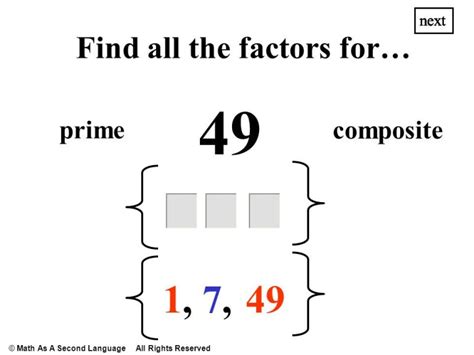What Are The Factors Of 49
Kalali
Apr 05, 2025 · 4 min read

Table of Contents
What are the Factors of 49? A Deep Dive into Number Theory
The seemingly simple question, "What are the factors of 49?" opens a door to a fascinating world of number theory. While the immediate answer might seem obvious, exploring this question allows us to delve into concepts like prime factorization, divisibility rules, and the properties of perfect squares. This comprehensive guide will not only answer the question but will also provide you with a deeper understanding of the underlying mathematical principles.
Understanding Factors
Before we tackle the factors of 49, let's establish a clear definition. A factor (or divisor) of a number is a whole number that divides the number evenly, leaving no remainder. In other words, if a is a factor of b, then b divided by a results in a whole number.
For example, the factors of 12 are 1, 2, 3, 4, 6, and 12 because each of these numbers divides 12 without leaving a remainder.
Finding the Factors of 49
Now, let's focus on 49. To find its factors, we can systematically check each whole number to see if it divides 49 without a remainder.
- 1: 49 divided by 1 is 49 (no remainder).
- 7: 49 divided by 7 is 7 (no remainder).
- 49: 49 divided by 49 is 1 (no remainder).
Therefore, the factors of 49 are 1, 7, and 49.
Prime Factorization and its Significance
The concept of prime factorization is crucial in understanding the factors of any number. A prime number is a whole number greater than 1 that has only two distinct factors: 1 and itself. Prime factorization is the process of expressing a number as the product of its prime factors.
49 can be expressed as 7 x 7, or 7². This means that 7 is the only prime factor of 49, and it appears twice. This prime factorization is unique to each number (Fundamental Theorem of Arithmetic), making it a powerful tool in number theory.
The Importance of Prime Factorization
Prime factorization has numerous applications in mathematics and computer science, including:
- Cryptography: The security of many encryption methods relies on the difficulty of factoring very large numbers into their prime factors.
- Simplifying Fractions: Prime factorization helps simplify fractions to their lowest terms.
- Finding the Least Common Multiple (LCM) and Greatest Common Divisor (GCD): Prime factorization is an efficient method for finding the LCM and GCD of two or more numbers.
Exploring the Properties of 49
49 possesses several interesting properties that contribute to our understanding of its factors:
49 as a Perfect Square
49 is a perfect square because it is the square of a whole number (7² = 49). This property directly influences its factors. Perfect squares always have an odd number of factors. This is because the square root of the number is always a factor, and it is paired with itself.
Divisibility Rules and 49
While there isn't a specific divisibility rule for 49, we can utilize the divisibility rule for 7. A number is divisible by 7 if when we subtract twice the last digit from the remaining leading truncated number, the result is divisible by 7. For 49, this isn't strictly necessary, as it's a small enough number for direct division.
Factors and Their Relationships
Understanding the relationships between factors is fundamental to number theory. Let's explore some of these relationships in the context of 49:
- Pairs of Factors: Observe that the factors of 49 (1, 7, 49) can be paired as (1, 49) and (7, 7). The product of each pair equals 49. This pairing is a characteristic of all numbers.
- Factor Pairs and Perfect Squares: In perfect squares like 49, one of the factor pairs consists of the square root repeated (7, 7).
Expanding the Concept: Factors of Other Numbers
Applying the concepts we’ve learned about the factors of 49, let's explore the factors of other numbers. Consider the number 100:
- Finding Factors: The factors of 100 are 1, 2, 4, 5, 10, 20, 25, 50, and 100.
- Prime Factorization: The prime factorization of 100 is 2² x 5².
- Perfect Square: 100 is a perfect square (10² = 100).
Practical Applications of Factorization
The concept of factors extends far beyond theoretical mathematics. It has numerous applications in various fields:
- Computer Science: Algorithms used in cryptography and data structures often rely on the properties of factors and prime numbers.
- Engineering: Engineering design sometimes involves calculations that utilize factor analysis.
- Everyday Life: Dividing items into equal groups (e.g., arranging chairs evenly in a room) requires an understanding of factors.
Conclusion: More Than Just a Simple Question
The initial question, "What are the factors of 49?", serves as a springboard to explore a rich tapestry of mathematical concepts. By understanding factors, prime factorization, and the properties of perfect squares, we can appreciate the interconnectedness of mathematical ideas. The seemingly simple act of finding factors reveals a deeper understanding of number theory and its practical applications in various fields. This exploration demonstrates that even seemingly simple mathematical concepts can lead to a much richer understanding of the world around us. Continue to explore, question, and discover the fascinating world of numbers!
Latest Posts
Latest Posts
-
How Many Feet Are In 300 Meters
Apr 06, 2025
-
How Far Is 50 Feet In Meters
Apr 06, 2025
-
What Is The Lowest Common Multiple Of 8 And 9
Apr 06, 2025
-
How Many Feet In 0 2 Miles
Apr 06, 2025
-
11 Feet Is How Many Meters
Apr 06, 2025
Related Post
Thank you for visiting our website which covers about What Are The Factors Of 49 . We hope the information provided has been useful to you. Feel free to contact us if you have any questions or need further assistance. See you next time and don't miss to bookmark.
